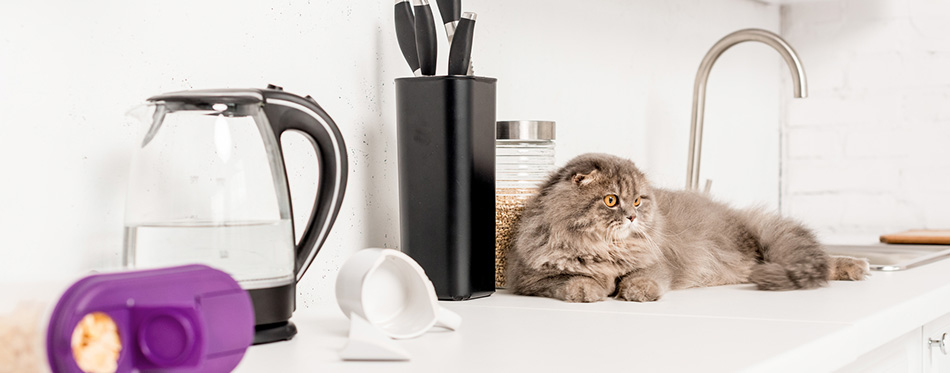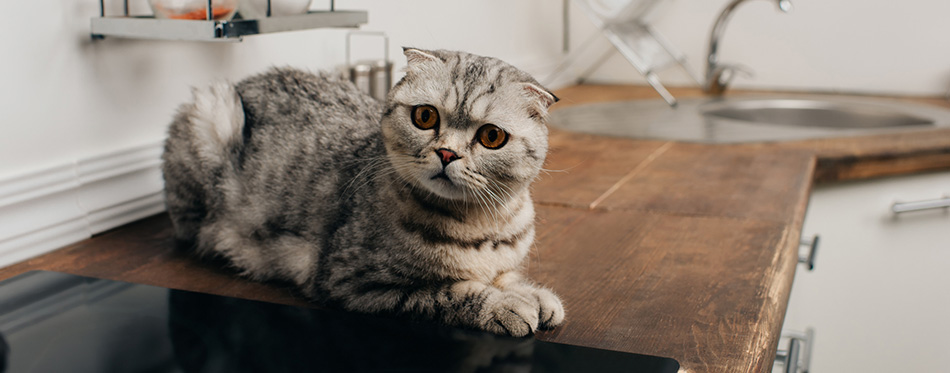It doesn’t seem to matter whether you give your cat a comfortable bed or the most expensive toys, sooner or later, they’re going to find their way to your countertops. If you’ve ever owned an indoor cat, we’re sure you’ve been impressed at least once or twice by their seemingly superhuman leaping ability. To the annoyance of many pet owners, however, this has resulted in a lot of fragile things getting broken and a lot of mess being made. If you’re currently experiencing this problem, here are a couple of tips to make your counters cat-free.

Why Your Cat Likes Jumping onto Your Counters
There are many reasons why cats enjoy being on kitchen counters no matter how much of a hazard it may pose to them. For starters, there are cats that frequently hop on kitchen counters to get to a water source. Contrary to popular belief, not all cats are afraid of running water. They may do this to get a drink if they’re thirsty or to cool themselves off on hot summer days. Head over to our review of the best cat water fountains for more choices.
Cats are attracted to the smell of kitchen counters as well, especially if this is where you prepare the food that they enjoy. Some cats may even be tempted to hop onto a countertop while you’re working on butterflying a juicy chicken breast or slicing a fillet of tuna. Make sure that your cat is secured in another location to avoid accidents. It’s also advisable to clean up well afterwards so your cat can’t get to the crumbs or leftover.
Cats are also daredevils in feline form. They simply can’t get enough of heights. This is the same principle that governs why scratch posts and towers are among the most popular accessories in any cat lover’s home. To a lot of cats, the kitchen is their very own parkour course with plenty of chairs, tables, center islands, and of course, countertops to jump on.
Deter the Jumping
Now, there are a couple of things you can do to deter you pet from jumping onto surfaces they’re not allowed on. The first thing you can do is condition them to avoid the countertops or anywhere else they’re not supposed to be. If you have a bit of a budget to work with, you can use pet sprays that help discourage felines from going to a particular surface. They absolutely despise this. Cats are smart animals and, sooner or later, they’re going to associate jumping on your countertops as a grounds for being sprayed.
If you can keep a watchful eye, you can use a manual spray. However, if you’re quite a busy person, you can purchase a motion-activated pet spray instead. Meanwhile, if you’re a little bit strapped for cash, you can use a spray bottle filled with clean water to achieve close to the same effect. If you’re looking for a more natural alternative, you can scatter a couple of lemon or orange peels on your counters. The problem with this though is that the citrus skins dry out and lose their efficacy quickly – only lasting for a couple of hours at most.
If you fancy yourself a DIY expert, another trick you can use to keep your cat off of your countertops is attaching a piece of double-sided tape on the edges. This is one of the easiest and most effective ways you can stop your feline from choosing your kitchen counter as their favorite landing spot. The downside to this, however, is the difficult cleanup that comes afterward. Similarly, cats hate the feeling and sound of crinkled aluminum foil, so attach a strip or two at the edge of the counters they like to leap on.
Some pet owners also swear by the “pennies in a can” trick. This involves strategically positioning a tin can that’s filled with coins, peas, or beans in a spot on the counter where your cat will knock it down when it jumps. This is effective if your cat has a preferred landing spot. If it doesn’t, and you have the time and resources, you can make a bunch of these cans and place them a couple of inches apart from one another. Once one gets knocked over, your cat will be turned off from jumping since they’ll absolutely hate the loud sound it makes.
Make Changes to the Environment
Environmental modification techniques can also work wonders in deterring your cat from jumping on your countertops. First and foremost, if your cat can only get to your counter by hopping on a chair first, then your best course of action would be to remove the chair. After a few failed attempts at jumping directly onto your countertop, your cat will simply get tired out and stop trying. If you can, get your cat a tower as well, which is actually made for leaping on. This prevents them from looking for other areas in the house to jump on.
It may be obvious, but it’s also important to keep in mind that you shouldn’t be egging your cat on to jump onto high places. Keep your countertops as clean as possible. As we’ve mentioned previously, the reason why your cat may be going there is because they want to snack on the crumbs that have been left over from a subpar cleanup job. Provide your cat with drinking water in an area with low foot traffic as well. Avoiding stressors like this help teach a cat to drink in just one appropriate place, and not in the toilet or kitchen sink.

Divert Your Cat’s Attention
You can also divert your cat’s attention if it tries to jump onto one of your countertops. You can do this by showing them their favorite toy while they’re getting ready to jump. You can even toss it in the other direction to force them to run after it. Afterwards, give him a treat or a massage to reinforce the behavior of not jumping on countertops. For more options, check out our detailed reviews of cat toys and interactive cat toys.
Just utilizing one of these tips may not have the desired effect, so use a combination of them if possible. If you follow these reminders, your cat will stop leaping onto your counters in no time.
Sources:
- Keeping your cat off the counter – Animal Humane Society
- Training Your Cat To Stay Off The Kitchen Counter – Cat Health

